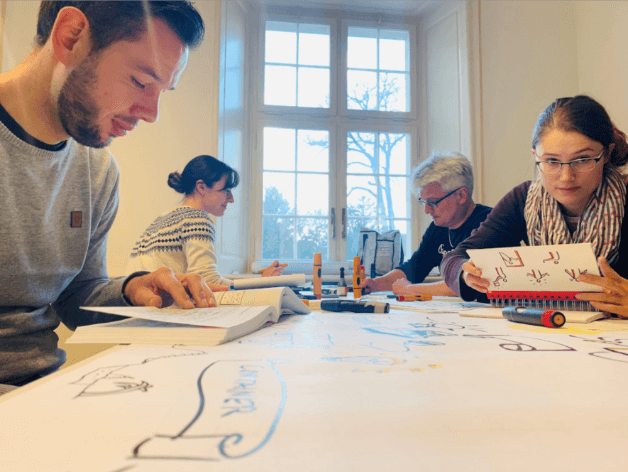Open Talk
The pleasure of change
An interview with Andreas Sägesser – TBF’s learning organisation expert – on the power of collaboration, individual scepticism, shared ‘a-ha’ moments and mutual progress.

Andreas Sägesser
Andreas, you trained as an electronics engineer and electrical engineer, and for over 20 years you were a teacher and lecturer, most recently at the Zurich University of Teacher Education. What made you put aside your academic career and join TBF?
In all my years as a lecturer, I found that exchange between people is a central – if not THE central – element of learning. Years ago, I happened to come into contact with representatives of TBF for the first time, and I noticed that they had experienced the same thing. This gave rise to ideas about reorienting the entire organisation to enable precisely this type of exchange. We soon noticed that we were able to inspire each other and offer each other positive reinforcement. Over the last six years, there has been a symbiosis between TBF and the university: we were able to substantiate and test the latest findings from research in the area of organisational development in business, and in return I got to preserve this real-life experience in teaching. In recent years, I have come to the conclusion that hierarchical structures tend to hinder this exchange. While TBF has managed to organise itself around flat hierarchies in a relatively agile, straightforward manner, the same could not be said for the university. As a result, I decided to make a complete switch to TBF, because it offered me the ideal platform and the necessary freedom to strategically approach and successfully implement organizational development in business.
Why is the ‘learning organisation’ so important to organisational development at TBF?
Many of the projects that we design and implement are one-offs. Because of this, it’s natural that we take to new tasks with enthusiasm and creativity. As an organisation we believe in life-long, voluntary learning.
What does that mean in real terms?
In 2013, we offered the first LearningHub on the topic of competency management and personal development. This resulted in an environment in which we were able to work and learn together around the topic at hand in a way that brings various mutually constructive competencies together. A key advantage of shared learning is that the group’s willingness to learn is larger than the sum of the individuals’. We want to learn and work, not compartmentalise our thinking!
Is that all it is?
No, of course not. Another important element for successful progress in an organisation is people’s individual development. We don’t just create scope for shared learning, but also ensure that everyone documents their personal learning processes, maintains a level of critical inquiry at all times and shares their insights with other employees. Along the way, everyone creates their own personal learning portfolio by describing their cross-divisional competencies and documenting the required resources. We draw no distinction between private and professional competencies, because both advance the organisation as a whole. Linking resources with competencies allows us to act efficiently. Finally, we capture the learning process in a digital diary, share this with the organisation if required and thus ensure that anyone can access the necessary skills at any time, no matter where they are.
How is all this incorporated into customer projects?
As I mentioned earlier, we design and implement infrastructures that have before never existed in this form. This goes hand in hand with the fact that the required skills often change on the customer’s side or are even turned upside down. We are not ‘just’ designing and implementing the technical infrastructure, but also enabling the people who will operate these infrastructures for decades by helping them experience positive changes and assisting in their development. As we build the infrastructure, we are also in a position to develop the organisation and uncover additional potential. This working style embodies the spirit of a learning organisation.

A collaborative learning experience at Beckenhof LearningHub on the topic of ‘visualisation‘

